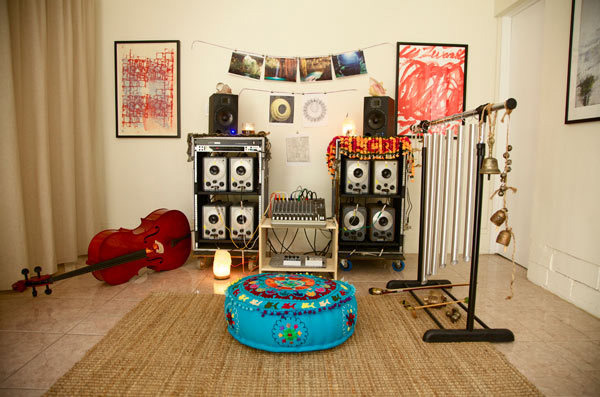The Edge of Forever
by Margaret Wappler

The instrumentation for The Edge of Forever includes eight sin-wave oscillators, bells, rattles, and strings. Photo: Emily Lacy, 2012. Courtesy of Elizabeth Cline.
The first thing to know about December 21, 2012, is that the Maya civilization didn’t mark it as doomsday. Have an apocalypse party if you must, but prepare for the standard conclusion. What the 21st does signify is the close of one cycle and the beginning of another. The Maya called this particular cycle a baktun (or b’ak’tun), measuring nearly 400 years on their long-count calendar, which spans roughly 5,125 years starting in 3114 B.C.
Admittedly, things get a little spooky when the 13th baktun ends. Instead of properly starting the 14th baktun, the Maya calendar resets to zero like some haunted VCR. Why? No one really knows, but this cryptic detail has fueled much speculation: Doomsdayers say we’re toast. New Age communities want to announce a new dawn. And opportunistic ravers just want to get high near the Maya ruins of Chichén Itzá.
For artist Elizabeth Cline and composer Lewis Pesacov, the end of this era presented another kind of opportunity: a chance to create a “pocket” opera about one of their obsessions. In the last two months, Pesacov has been writing a 45-minute score while Cline has been polishing her libretto for The Edge of Forever, a chamber operetta inspired by the ancient culture’s broad approach to time. The Kickstarter-funded production will be performed on the auspicious date at the Philosophical Research Society, a Mayan Revivalist building in Los Feliz.
“Everything now is so fast-paced. Info is flying at us all the time,” Pesacov says during an interview at the couple’s Echo Park apartment. “We’re interested in stepping back and connecting to a deeper, more substantial timeline.” The idea for The Edge of Forever initially sparked a couple of years ago during their vacation to the Yucatán Peninsula. They toured the cenotes, deep-water caves revered by the Maya, and read from Popol Vuh, the Maya book of creation, on the beach. Though busy with day jobs—Cline as Assistant Director of Machine Project and Pesacov as a music producer and guitarist in the local Afro-pop band Fool’s Gold—they batted around the idea of an opera revolving around Maya mythology.
“It just lent itself perfectly to the concept and artifice of opera,” Cline says. “At first you’re drawn to the sensationalistic idea of time ending, but it’s really about the cycles of love and hope.”
The Edge of Forever isn’t the duo’s first collaboration. In 2011, their Tragedy on the Sea Nymph set sail at Echo Park’s Machine Project as a filmed opera with an all-canine cast.1 Human singers, most notably tenor Ashley Faatoalia, vocalized the dogs’ dashed hopes. Faatoalia, whom the creators found via Craigslist, also has the starring role in The Edge of Forever, singing arias Pesacov wrote for his range.
Like the Maya calendar itself, Cline’s three-act libretto spans “untold cycles of time,” but The Edge of Forever will contain only its final climactic scenes. “The audience will be there for just one snapshot of the work,” Cline explains. An ancient astronomer named Laakan (Faatoalia) is dwelling in a blue-lit cenote stocked with offerings such as masks, copper bells, shells, and obsidian arrows. After meditation and despair, he accepts his prophecy from a collective of scribes as the usher of a new era.
“We wanted to end on this moment of real hope and curiosity, an open-endedness,” Cline says.
Pesacov’s score, based on interlocking systems and improvisation, will also dovetail with those infinite themes. Musicians will play eight sin-wave oscillators that generate pure tone indefinitely, as well as conch shells (an instrument used by Maya and other tribal cultures today) and a battery of bells, rattles, and traditional strings.
But for all the ceremonial touches, Cline and Pesacov wanted The Edge of Forever to feel authentic to its own time and context. “We’re taking cues from the ancient hieroglyphs, but we’re not enacting a Maya ceremony,” Pesacov says. “This is its own immersive experience.”
In addition to time, The Edge of Forever will also try to capture another element of the human experience known for being both eternal and fleeting. “It’s about a cosmology connected to love,” Cline says. “We want to leave the audience with a momentous feeling.”
“The Edge of Forever” will be performed on Friday, December 21, 2012 at the historic Philosophical Research Society in Los Feliz. For tickets and more information, see www.theedgeofforever2012.com